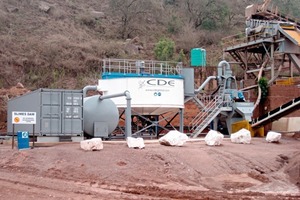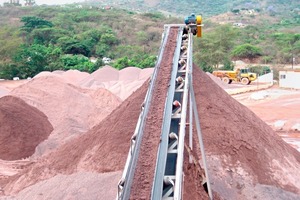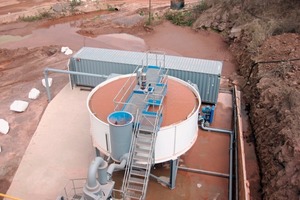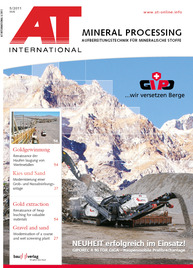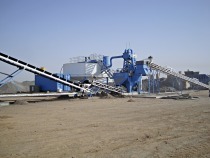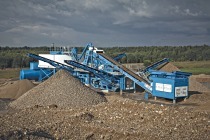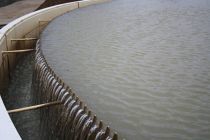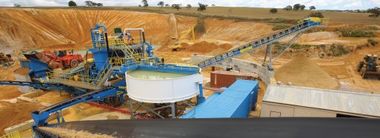NPC change the face of washing in South Africa
Natal Portland Cement have announced major productivity and efficiency improvements at their Sterkspuit quarry in KwaZulu-Natal/South Africa following the introduction of a new washing plant from CDE Global. The loss of quality fines during the sand processing phase of production has been eliminated following the introduction of the CDE EvoWash plant to replace a bucket wheel de-waterer previously employed at the Sterkspuit site. NPC also report an industry first with the introduction of an AquaCycle high rate thickener allowing for the recycling of 90 % of the water used in the washing of their crushed material. While thickener systems are in use throughout the mining sector in South Africa it is believed that the CDE AquaCycle now in operation is the first of its kind in a crushed rock or sand and gravel application.
NPC are a subsidiary of the global construction materials producer, Cimpor of Portugal, and operate eleven facilities in South Africa with total production of 1.7 million t. These include seven ready mix concrete plants, three aggregate production plants of which Sterkspuit is one, two grinding plants and one cement plant.
Sterkspuit quarry is located in the Cliffdale area some 30 km from Durban on the Eastern coast of South Africa. The CDE washing plant (Fig. 1) is processing tillite from the existing blasting and crushing operations and the washed material is being sold by NPC for use in the production of various asphalt mixes and as a replacement for river sand in their own concrete plants. From the crushing plant the minus 9.5 mm material is first sent to a CDE ProGrade P2-75 double deck rinsing screen fitted with modular Isenmann polyurethane panels on both decks. The ProGrade produces a 6.7-9.5 mm and a 5-6.7 mm aggregate with the minus 5 mm material being delivered to the sand washing phase.
The ProGrade is specifically designed for washing which is a major advantage when compared to many other screens on offer according to CDE. “In the majority of cases rinsing screens are simply dry screens with the crude addition of a few spray bars” explains CDE Sales Manager in South Africa, Des Crawford. “The spray bars are only a small part of the overall design which we believe makes the ProGrade screen the most effective aggregate washing screen on the market.” The design and construction of the spray bar assembly which is a fully independent structure is one of the key features of the ProGrade range. “The spray bar assembly is not rigidly connected to the screen box as is the case on many other rinsing screens” explains Des Crawford. “This eliminates vibration and the associated risk of plant failure.” There is also a major focus on reducing the loss of both material and water during screening through the use of splash prevention over decks and specialist spray bar seals.
The advantages of polyurethane screen media on the ProGrade have been immediately clear to Dave Kendall, General Manager at Sterkspuit quarry. On the previous washing plant the wire meshes had been lasting only a few weeks due to the abrasive nature of the material being processed. The polyurethane screen deck on the ProGrade have shown enhanced performance in the first few months of operation and have resulted in a reduction in the costs of maintenance both in terms of spare part costs and the man hours. An additional advantage is the ease of fitting of the modules when compared with side tensioned wire meshes from a health and safety point of view.
Prior to the introduction of the new washing plant it was the sand washing process which was the biggest area of concern for NPC at Sterkspuit quarry. “Sand production was very inefficient with the bucket wheel that we had on site” explains Dave Kendall. The bucket wheel was losing up to a third of the fine sand that NPC needed for their production of asphalt sand leading to significantly increased production costs. The result of this was very coarse sand from the bucket wheel which meant NPC had to buy in large quantities of natural fine sand to blend with this coarse material. “We had to buy in between 70 % and 80 % of the fine sand we used as a result of the inefficiencies of the bucket wheel as a means of sand production” explains Dave Kendall.
The new CDE washing plant employs an EvoWash 71 system which has been employed on many similar applications throughout the world. As a result of the increased capability to recover the fine sand material following introduction of the EvoWash system, NPC have seen the quality of the washed sand improve and they have been able to dramatically reduce the need to purchase natural fine sand from external suppliers as the washed sand product now meets the specifications they require for asphalt mixes (Fig. 2).
Following the sand washing phase the waste water from the EvoWash is delivered to an AquaCycle thickener (Fig. 3) to allow for the recycling of 90 % of the water used in the washing process. The AquaCycle has been extensively used in recent years on many CDE installations and offers operators a means of reducing the environmental impact of their operations while also having other advantages such as increased health and safety on site and a greatly reduced amount of space required to accommodate settling ponds.
Wash water containing the minus 75 µm material from the EvoWash first enters the AquaCycle thickener via a de-aeration chamber located on the side of the thickener tank. The location of the waste discharge point at the top of the EvoWash allows for a gravity feed of this material eliminating the requirement for the additional sumps and pumps that can be required with other systems.
In the de-aeration chamber the material is dosed with a small amount of flocculant which is prepared in the FlocStation poly dosing plant. Material is then delivered to the centre of the circular AquaCycle tank before being released. The flocculant that has been mixed with the waste material forces of the minus 75 µm particles to bind together and their cumulative weight allows these particles to fall to the bottom of the tank where a set of rakes rotate to maintain an even consistency within the settled sludge.
The clean water overflows an integrated weir at the edge of the AquaCycle thickener and is then sent to the AquaStore collection tank for recirculation to the washing plant. When the sludge reaches an appropriate density the rakes report back to the PLC control panel which activates the sludge pump. The settled sludge is then delivered to nearby settling ponds. The settling ponds at Sterkspuit previously required a substantial area due to the lack of water recycling coupled with the loss of large volumes of material to the ponds. The reduction area required following the introduction of the AquaCycle gives NPC additional security in relation to the safe storage of waste material from their operations.

